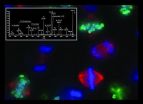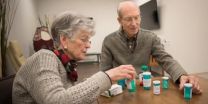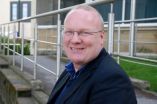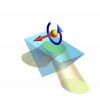(Press-News.org) Uncontrolled cell growth and division is a hallmark of cancer. Now a research project led by the University of Dundee has provided the most complete description to date of the gene activity which takes place as human cells divide.
Researchers have managed to gather data which details the behaviour of protein molecules encoded by over 6000 genes in cancer cells, as they move through the cell cycle. The team has used advances in technology and data analysis to study how genes work over time in cancer cells, as opposed to capturing a `snapshot' of activity – a leap forward they describe as akin to ` jumping from still photography to video'.
The new results from the Dundee team - carried out in collaboration with the Wellcome Trust Sanger Institute in Cambridge and the University of North Carolina - have been published in the prestigious international journal eLIFE.
Cells are extremely complex environments: at any one time, thousands of different genes are active as molecular templates to produce messenger RNA (mRNA) molecules, which themselves are templates used to produce proteins. However, not all genes are active at all times inside all cells. As cells grow and divide as part of the cell division cycle, genes are switched on and off on a regular basis. Similarly, the patterns of mRNA and protein production are different in, for example, immune system and skin cells.
"What we have been able to produce is a detailed analysis of protein activity in human cancer cells that exceeds what was previously possible," said the project leader Professor Angus Lamond, of the College of Life Sciences at Dundee. "It is essential to study how gene activity varies over time if we are to understand the complex processes in cancer cells, as the dynamic is changing all the time.
"Previously it has been possible to capture a time-averaged snapshot of this activity, but what we can now do is give a much fuller picture."
Dr Tony Ly, the lead researcher on the project in Professor Lamond's team, said, "This work provides a better understanding of the complex relationship between the levels of an mRNA and its corresponding protein product. It also demonstrates how it may be possible to detect subtle but important differences between cell types and disease states, including different types of cancer."
The work of the Dundee team providing this new high-resolution mapping of gene expression at the protein level offers great promise also for the future development of safer new drugs. Almost all drugs directly or indirectly affect proteins.
Proteomics – the comprehensive detailed analysis of cell proteins – is rapidly emerging as the next major phase beyond genome analysis, with great potential to improve our understanding of human disease and help the development of new treatments.
The proteomics research team in Dundee led by Professor Lamond has established a major international role in this new field that is set to soon increase further with the imminent opening of the new Centre for Translational and Interdisciplinary Research (CTIR) building at the University of Dundee.
The CTIR building, due to open this summer, will provide space for a major expansion in proteomics equipment combined with new computing resources for advanced data analysis. This will cement the leading role Dundee has established in advanced protein analysis within the UK.
INFORMATION: END
Researchers capture 'most complete' picture of gene expression in cancer cell cycle
2014-03-06
ELSE PRESS RELEASES FROM THIS DATE:
Sudden cardiac death: Genetic disease ARVC more common than hitherto assumed
2014-03-06
The genetic disease ARVC leads to sudden cardiac death and is more common than it has been hitherto assumed. This is reported by an international team of researchers headed by Prof Dr Hendrik Milting from the Heart and Diabetes Center NRW in the "European Heart Journal". The molecular biologist working at the Ruhr-Universität's clinic in Bad Oeynhausen revealed that all families who are known to be affected by the disease share the same genetic origin. There must be other families in Europe who also carry the genetic mutation but who are not yet known.
Mutation initially ...
Study suggests higher levels of omega-3 in diet are associated with better sleep
2014-03-06
A randomised placebo-controlled study by the University of Oxford suggests that higher levels of omega-3 DHA, the group of long-chain fatty acids found in algae and seafood, are associated with better sleep. The researchers explored whether 16 weeks of daily 600 mg supplements of algal sources would improve the sleep of 362 children. The children who took part in the study were not selected for sleep problems, but were all struggling readers at a mainstream primary school. At the outset, the parents filled in a child sleep questionnaire, which revealed that four in ten ...
When art and science collide -- the masterpiece unmasked
2014-03-06
This news release is available in French. Gallery owners, private collectors, conservators, museums and art dealers face many problems in protecting and evaluating their collections such as determining origin, authenticity and discovery of forgery, as well as conservation issues. Today these problems are more accurately addressed through the application of modern, non-destructive, "hi-tech" techniques.
Dmitry Gavrilov, a PhD student in the Department of Physics at the University of Windsor (Windsor, Canada), along with Dr. Roman Gr. Maev, the Department of Physics ...
Half the survivors in 1 Japanese town have PTSD symptoms
2014-03-06
Though just two of Hirono's 5,418 residents lost their lives in Japan's mega-earthquake and tsunami, a new study shows that the survivors are struggling to keep their sanity.
One year after the quake, Brigham Young University professor Niwako Yamawaki and scholars from Saga University evaluated the mental health of 241 Hirono citizens. More than half of the people evaluated experienced "clinically concerning" symptoms of post-traumatic stress disorder. Two-thirds of the sample reported symptoms of depression.
Those rates exceed levels seen in the aftermath of other ...
Heart failure unknowns a roadblock to managing health
2014-03-06
Al Brommeland found a true partner in his wife Florence. Through 57 years of marriage they've proved a formidable team, swinging and bowing at square dances, kicking up dust in their clogs, and now in their golden years, taking daily strolls side by side.
When Al started experiencing irregular heart rhythm 12 years ago, the couple worked together to stay healthy. It hasn't been easy, both in terms of symptoms—emergency doctors stopped and restarted Al's heart eight times over the years—or finding answers to their questions about how to best manage his illness, recently ...
UCLA engineering team increases power efficiency for future computer processors
2014-03-06
Have you ever wondered why your laptop or smartphone feels warm when you're using it? That heat is a byproduct of the microprocessors in your device using electric current to power computer processing functions — and it is actually wasted energy.
Now, a team led by researchers from the UCLA Henry Samueli School of Engineering and Applied Science has made major improvements in computer processing using an emerging class of magnetic materials called "multiferroics," and these advances could make future devices far more energy-efficient than current technologies. ...
LSUHSC mental health care model reduced symptoms in those most affected by BP oil spill
2014-03-06
New Orleans, LA – A model of care developed by the Department of Psychiatry at LSU Health Sciences Center New Orleans School of Medicine to provide mental health services after the Deepwater Horizon Gulf Oil Spill reduced both mental health and general medical symptoms. The novel approach embedded psychiatrists, psychologists, social workers and telemedicine resources into primary care clinics in the most affected areas. This new model can be used in communities at risk for disasters and rural communities with limited mental health resources. The initiative is featured ...
Collecting digital user data without invading privacy
2014-03-06
This news release is available in German.
The statistical evaluation of digital user data is of vital importance for analyzing trends. But it can also undermine the privacy. Computer scientists from Saarbrücken have now developed a novel cryptographic method that makes it possible to collect data and protect the privacy of the user at the same time. They present their approach for the first time at the computer expo CeBIT in Hannover at the Saarland University research booth (hall 9, booth E13).
"Many website providers are able to collect data, but only a few manage ...
Hudds researchers call for major 'de-escalation' survey within the NHS
2014-03-06
VERBAL and physical aggression towards health and social care staff is on the increase. The NHS has reported a rise of 5.8 per cent in reported assaults – up to 63,199 in 2012/13. Now a University of Huddersfield lecturer has called for a programme of research to establish the best methods for dealing with the problem.
Various techniques known as "de-escalation" have evolved in order to calm threatening situations. But there is a lack of solid evidence to identify the most successful approaches, according to Dr Andrew Clifton, a former community psychiatric nurse who ...
Extraordinary momentum and spin discovered in evanescent light waves
2014-03-06
A team of researchers from the RIKEN Center for Emergent Matter Science (CEMS) in Japan has identified unexpected dynamic properties of a type of light wave called evanescent waves. These surprising findings contrast sharply with previous knowledge about light and photons.
The study carried out in the Quantum Condensed Matter Research Group (CEMS, RIKEN, Japan) led by Dr. Franco Nori is published today in the journal Nature Communications.
Energy, momentum, and angular momentum are the main dynamic characteristics of physical objects. It is well known that light propagating ...




